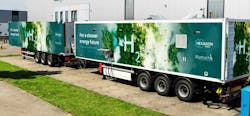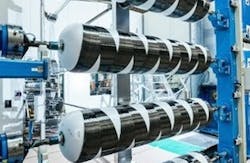German Railway operator contracts Hexagon Purus subsidiary to provide H2 Refueling Stations
Railway and logistics service firm Deutsche bahn has contracted Hexagon Purus subsidiary Wystrach GmbH to provide the mobile H2 refueling stations and stationary storage. Wystrach’s Type 4 hydrogen cylinders will be used for rail and other mobility needs in Germany, according to the release detailing the deal worth about 2.5 million Euros ($2.67 million U.S. dollars, currently).
“Our mobile hydrogen refueling station offers a plug and play solution for our customer with one-day installation on-site,” Matthias Kötter, Head of Sales Wystrach, Hexagon Purus, said in a statement. “The mobile hydrogen refueling station enables emission-free logistics and intralogistics with no to where it can be deployed to support hydrogen fleet adoption.”
Hydrogen does not contain carbon in its chain and does not emit CO2 when combusted or converted to electricity. To be truly carbon-free hydrogen, it must be created by electrolyzers powered by low or no-carbon energy resources such as wind, solar, hydro and nuclear. Hydrogen also is produced via steam reforming of methane gas, which has four H2 atoms and one carbon atom.
The transportation industry, which emits close to 20 percent of greenhouse gases, is making public commitments toward e-mobility solutions such as electric vehicles, especially for family-type vehicles. While EV manufacturers such as Nikola and Tesla are building Class 8 heavy-duty truck models, many transportation firms are exploring hydrogen because of its high energy density and relatively short refueling time compared to EV charging stations.
Hexagon Purus recently opened a new Type 4 cylinder manufacturing plant in Maryland. The company hopes to produce about 10,000 cylinders per year from the Westminster, MD., plant (see image above).
Customers for those H2 heavy-duty cylinders include New Flyer and Nikola, among others. The company hopes to deliver the mobile refueling stations and storage systems no later than the fourth quarter of this year.
In the U.S., companies such as Caterpillar, Chevon and BNSF Railway Co. are beginning collaborations around hydrogen fuel technology for the railroad vehicles.
About the Author
Rod Walton, EnergyTech Managing Editor
Managing Editor
For EnergyTech editorial inquiries, please contact Managing Editor Rod Walton at [email protected].
Rod Walton has spent 17 years covering the energy industry as a newspaper and trade journalist. He formerly was energy writer and business editor at the Tulsa World. Later, he spent six years covering the electricity power sector for Pennwell and Clarion Events. He joined Endeavor and EnergyTech in November 2021.
Walton earned his Bachelors degree in journalism from the University of Oklahoma. His career stops include the Moore American, Bartlesville Examiner-Enterprise, Wagoner Tribune and Tulsa World.
EnergyTech is focused on the mission critical and large-scale energy users and their sustainability and resiliency goals. These include the commercial and industrial sectors, as well as the military, universities, data centers and microgrids. The C&I sectors together account for close to 30 percent of greenhouse gas emissions in the U.S.
He was named Managing Editor for Microgrid Knowledge and EnergyTech starting July 1, 2023
Many large-scale energy users such as Fortune 500 companies, and mission-critical users such as military bases, universities, healthcare facilities, public safety and data centers, shifting their energy priorities to reach net-zero carbon goals within the coming decades. These include plans for renewable energy power purchase agreements, but also on-site resiliency projects such as microgrids, combined heat and power, rooftop solar, energy storage, digitalization and building efficiency upgrades.


